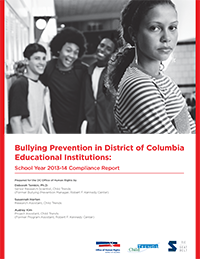 The Robert F. Kennedy Center for Justice and Human Rights’ bullying prevention initiative, RFK Project SEATBELT (RFKC) was contracted by the DC Office of Human Rights (OHR), in June 2013, to provide resources and support for DC public and public charter schools’ bullying prevention efforts. This contract moved to Child Trends in August 2014. From August 2013 through September 2014, an audit of each local education agency’s (LEA) anti‐bullying policy was conducted to determine the extent to which it is compliant with the 2012 Youth Bullying Prevention Act (YBPA; DC Law L19‐167).
The Robert F. Kennedy Center for Justice and Human Rights’ bullying prevention initiative, RFK Project SEATBELT (RFKC) was contracted by the DC Office of Human Rights (OHR), in June 2013, to provide resources and support for DC public and public charter schools’ bullying prevention efforts. This contract moved to Child Trends in August 2014. From August 2013 through September 2014, an audit of each local education agency’s (LEA) anti‐bullying policy was conducted to determine the extent to which it is compliant with the 2012 Youth Bullying Prevention Act (YBPA; DC Law L19‐167).
All LEAs were asked to submit their policies in September 2013, in accordance with the requirements of the YBPA. Submissions were accepted until September 30, 2014. Each submitted policy was reviewed, and a report of compliance was provided to the LEA and to OHR. Policies that were resubmitted were similarly reviewed. This report summarizes the current state of LEA compliance as well as the most‐often overlooked or missing required components in initially submitted policies.
Highlights of findings include:
- 57 of 61 (93.4 percent) of DC Public Charter LEAs as well as DC Public Schools submitted a bullying prevention policy to the DC Office of Human Rights by September 30, 2014.
- 42 of 61 DC Public Charter LEAs (70.5 percent) and DC Public Schools had policies compliant with the Youth Bullying Prevention Act of 2012 by September 30, 2014.
- 17 charter school policies were deemed compliant upon submission, all of which adopted the mayor’s Bullying Prevention Task Force’s model policy (“model policy”). The remaining 25 compliant policies were revised and resubmitted.
This report is limited to assessing whether or not an LEA has submitted a compliant policy. Further work is needed to understand LEAs’ implementation of these bullying prevention policies across multiple campuses as well as LEAs’ broader bullying prevention efforts. It is not assumed that LEAs will successfully prevent and intervene in bullying incidents simply by having a bullying prevention policy. However, having a compliant policy is a first step toward these goals. Further, having a compliant policy allows for greater transparency and clarity for the District’s students, parents, and guardians in seeking relief after a bullying incident.


